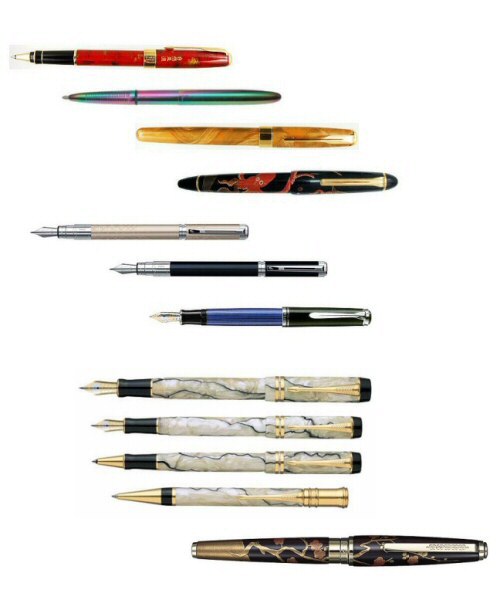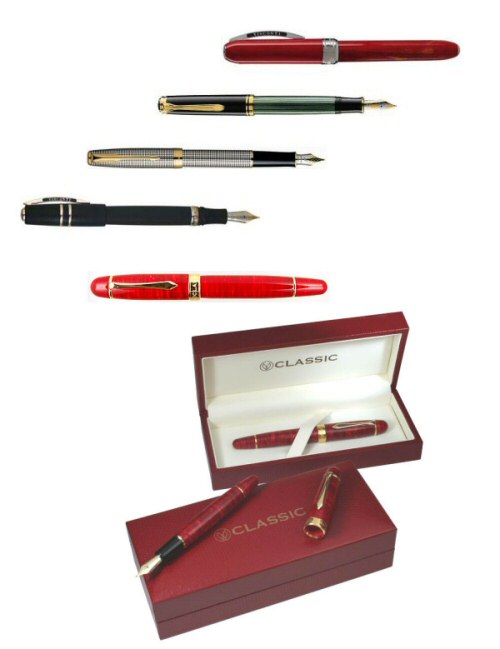Digger
talks to Simon at The Battersea Pen Home - Vintage and
Modern Fountain Pen Specialists


Digger:
Hello Simon.
Simon:
Hello David.
Digger:
Can please you tell us a bit about your background?
Simon:
It started as a hobby about eighteen years ago.
Digger:
Always the best way.
Simon:
Collecting pens and then the gradual slippery slope (Digger
laughs)
Digger:
I hear that story so many times that people start as
collectors and end up as dealers.
Simon:
Yes. I enjoyed the repairing side in particular so it
gradually took over from the day job.
Digger:
What was the day job?
Simon:
I was Group Finance Director for some London-based property
companies.
Digger:
And this is more exciting and satisfying?
Simon:
Yes.
Digger:
You must be quite handy then? Where did you get that from?
Simon:
For repairing? I donít know. I just always enjoyed
fiddling with pens.
Digger:
It must be quite intricate?
Simon:
Yes, you need to know what youíre doing. And back then, of
course, fifteen or eighteen years
ago, you could buy pens quite cheaply so you could practise
on them. It gradually took over and I went full-time on it
about fifteen years ago.
Digger:
What services do you provide Simon?
Simon:
We buy, sell and restore vintage fountain pens.
Digger:
You donít take in stray pens from the street?!
Simon:
We do service and repair customers pens and thatís about a
third of the business. I trained at Parker and Watermanís
factory at Newhaven about ten years ago to repair their
products.
Digger:
Canít get better names than that can you?
Simon:
No. So basically we buy pens ourselves, service them and
then retail them. And we provide the same service for
customerís pens.
Digger:
And there's lots of repeat business I should imagine?
Simon:
Yes, which over fifteen years has built up quite a lot. So I
would say one in five of the pens coming in is coming in
from people who have used us in the past.
Digger:
Thatís not bad is it?
Simon:
Thereís not actually a vast amount of competition.
Thereís only about three other people in the UK doing this
full-time. The repairing side.
Digger:
Are they liberally sprinkled throughout the UK?
Simon:
Yes.
Digger:
Whatís the 'Faberge' of pens?
Simon:
It would Dunhill Namikis or Namikis from the 1920s and early
30s.
Digger:
Would that be the same Dunhill who were making the lighters
as well?
Simon:
Yes. Basically Namiki is still there. Youíve probably seen
Pilot pens - the cheap ones? Pilot is the same company as
Namiki and they still produce very up-market makes of
lacquered pens that retail new today in the £2,000-£10,000
frame. But in the late twenties and early thirties they had
a distribution agreement with Dunhill and so some of their
pens of that period were branded Dunhill Namiki. So on the
nib it would say Dunhill Namiki, and those at auction have
fetched up to a quarter of a million.
Digger:
Has one ever passed through your hands?
Simon:
Yes, weíve had a number over the last few years. I mean,
not at that level but in the £5,000 to £15,000 range.
Digger:
Canít be bad.
Simon:
No.
Digger:
Why is retro and vintage so perennially popular?
Simon:
Itís strange, I mean I would say that the focus of our
pens has shifted and it depends a bit what you mean by
vintage. Fifteen years ago we were selling pens from the
1900s to the 1950s, principally to people who wanted to
collect them and would put them in a cabinet and not use
them. Over the last fifteen years thatís all changed
around and what our customers want today are
interesting-looking pens that are practical for everyday
use. So itís very rare that we sell a pen these days,
unless itís a Dunhill Namiki, that isnít going to be
used.
Digger:
I see, because I thought a lot of people tended to use
finger and keyboard these days?
Simon:
Well, people like to have a pen even if itís just for
Christmas cards or the odd letter. And so really most of our
sales today are pens that have been produced in the 1950s to
1980s.
Digger:
I was talking to a gentleman who does vintage watches and
another who does vintage toys and there is a tendency for it
to slowly creep forward and things are moving forward from
the 40s and 50s to the 60s, 70s and 80s. And I suppose that
makes perfect sense, really, doesnít it?
Simon:
Yes. Because pen design has moved on and the quality of the
ink flow on a pen of the 1920s and 30s is going to be poorer
than most pens today.

Digger:
What is the impact of The Internet for you?
Simon:
Weíve had a website for about thirteen years.
Digger:
You were pioneers then?
Simon:
Yes, we were one of the first vintage websites.
Digger:
There wasnít a lot going on in those days on the web, I
remember. Youíd end up seeing the same websites all of the
time.
Simon:
I know it was in the days when to have a company host your
website was £1,000 a year minimum and if you needed any
help with designing it, it started at £10,000 and worked up
from there.
Digger:
Amazing.
Simon:
Until then weíd been printing a colour printed catalogue
four times a year which probably cost us about £4,000 per
year.
Digger:
And the postage as well.
Simon:
Yes. Getting a photographer in to photograph the pens and
then having the printer design and put it together and the
printing. These were mailed out to about 600 people who paid
a subscription to receive it. And, at the same time, I was
buying pens in the UK, flying to the States, selling them
there, buying pens there and bringing them back here. And
you made a profit just on moving the pens around, because
what was rare here was still rare in the States but there
was greater availability. So there was this happy circuit
going on. And, of course, The Internet has changed all of
that because within a year or two of having the website
there was no point in paying to have the colour catalogue
printed because stock was selling off the website quite
happily.
Digger:
So no more jollies to America?
Simon:
Thatís right and then eBay started up Ė going to a show
in the States where one had been able to guy and buy quite
freely Ė when you asked the price of anything it would
always be ďWell, one went on eBay last week forÖĒ
Digger:
I hate that. It doesnít mean a thing, does it?
Simon:
No, but what that meant was that there was hardly any need
to keep going over to the States or Europe, because
everything, particularly now Ė you can have a look at half
a dozen different sites in the States and get what you want
without the £900 cost of flights and hotels.
Digger:
The instant gratification is what The Internet has made
possible. In the old days youíd have a wish list or wants
list and it might take years to complete it but now, if
youíve got the money, you can do it immediately. If the
items exist, that is.
Simon:
Thatís right, so the impact of The Internet has been
absolutely massive. But I think overall, although the
business is not less profitable than it was, it is less easy
and slightly more difficult to get the profit. But it does
mean that I donít have to fly to the States five or six
times a year.
Digger:
Or produce that catalogue.
Simon:
No, the grief and time consumption of producing the
catalogue. And lifeís quite relaxed as a result, really.
Digger:
Thatís a great impact that your quality of life has
improved. Thatís good, thatís good.
Simon:
Yes.
Digger:
You do sales and repairs Ė what are the most enjoyable
aspects?
Simon:
For me, itís the repairing. Iíve always enjoyed just
sitting at the workbench and just fiddling around.
Digger:
In an ideal world is that all youíd do or would you have
to have the other side as well?
Simon:
No, because apart from the workbench skill of taking pens
apart and putting them back together and nib polishing and
everything, the other thing Iíve built-up over fifteen or
eighteen years is knowledge of being able to look at a pen
and knowing what its value is. And so there is money to be
made by utilising that knowledge.
Digger:
Whoís going to inherit that knowledge?
Simon:
No-one, I donít think. In the sense of someone starting
out today, do you mean?
Digger:
No, I wonder if somebody will take over when you retire? An
apprentice perhaps?
Simon:
I donít know if itís that sort of a business.
Apprenticeships possibly Ė it would be nice for it to be
passed on but then I donít have the time to spend two or
three years on-and-off training someone.
Digger:
So it might be lost? I was talking to a gentleman who
repairs jukeboxes and he has no offspring who want to take
over so he says he has another twenty five years and then he
doesnít know what will happen to it. Thatís a shame when
skills and knowledge disappear.
Simon:
Yes, I hadnít really thought about it from that
perspective.
Digger:
Sorry about that, Iíve given you something to think about.
Simon:
Well, yes, I am conscious when batches of spare parts turn
up and you decide whether to buy them or not. What Iím
buying is enough in terms of the demand to keep us going for
100 years. Very often you donít get half a dozen, you get
200, and if you use five a year or less...
Digger:
But what you canít afford to do is run out of them.
Simon:
Yes, thatís right. And so oneís constantly overstocked
with certain parts and grubbing around for ones one
doesnít have.
Digger:
Well, maybe in fifteen or twenty years you might have to
start thinking about an apprentice.
Simon:
Yes. What there is Ė or doubtless there will be a few
other people around then who are, like I was, keen on
fiddling around with pens and repairing them. And then what
theyíd benefit from is if I pass on the parts stock to
them.
Digger:
Itís difficult to predict what The Internet will be like
in fifteen or twenty years time.
Simon:
Absolutely, I think from a competition angle weíre quite
well protected because the parts stock weíve built up over
the last eighteen years is not stuff you can just go out and
buy. So someone just starting up repairing today would
probably not be able to do very much at all, simply because
they havenít got the parts.
Digger:
What are your best sellers?
Simon:
Probably Parker Duofolds, Yard o Lead sterling silver pens
and pencils.
Digger:
these arenít; available from standard stockists?
Simon:
Yard o Lead are, theyíre a traditional Birmingham-based
silversmithing firm. The Parker Duofolds been produced since
the 1920s and most of the ones we now sell are from the late
80s. The other one is the Parker 51 and we sell refurbished
versions of that. Thatís probably, in terms of volume, our
best seller.
Digger:
Simon, many thanks for letting us know about The Battersea
Pen Home.
Simon:
Thank you David.
